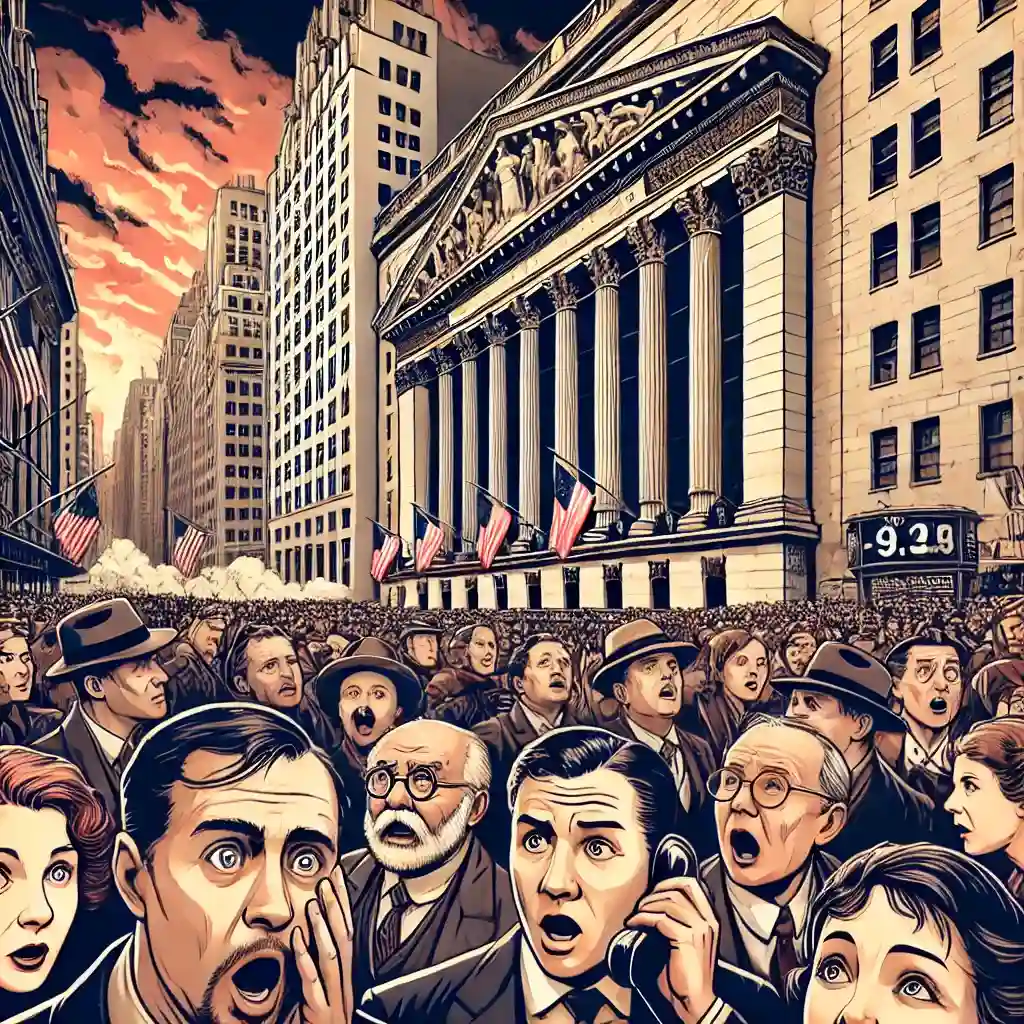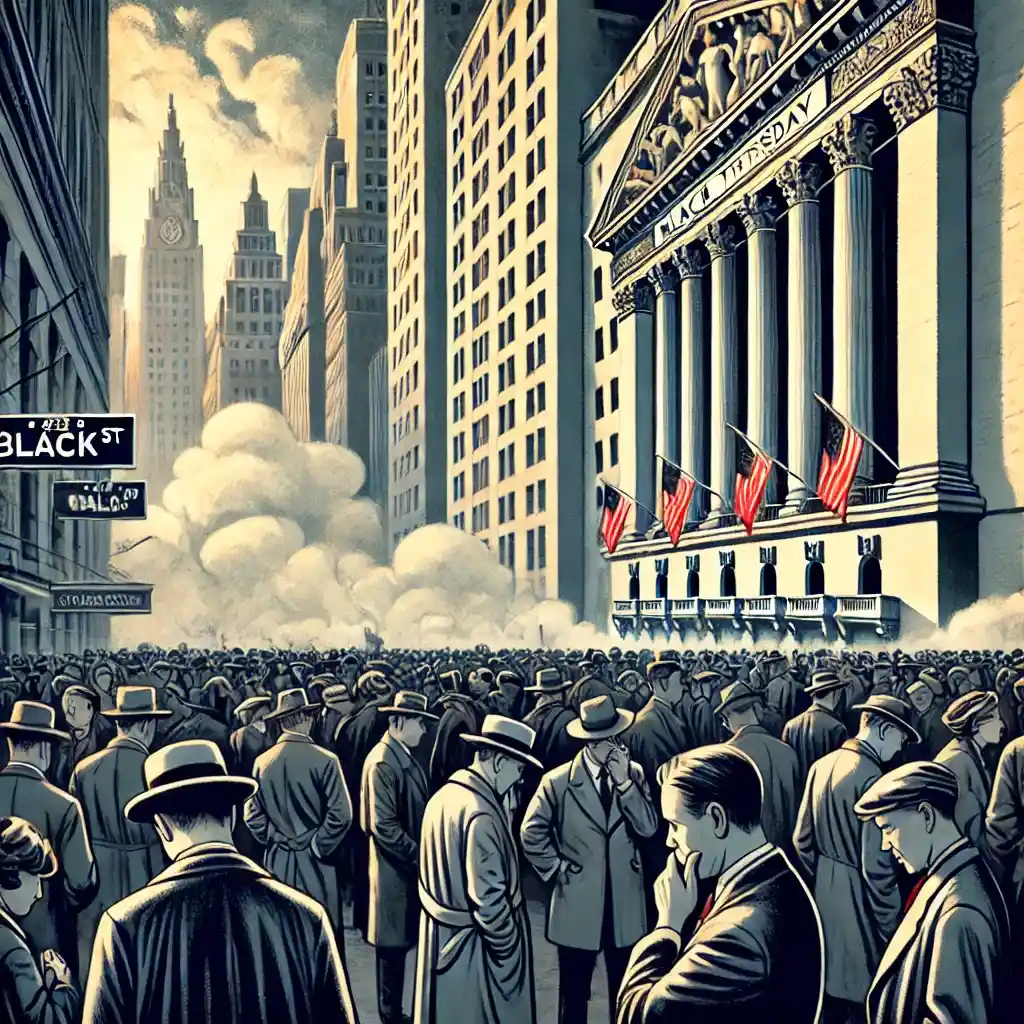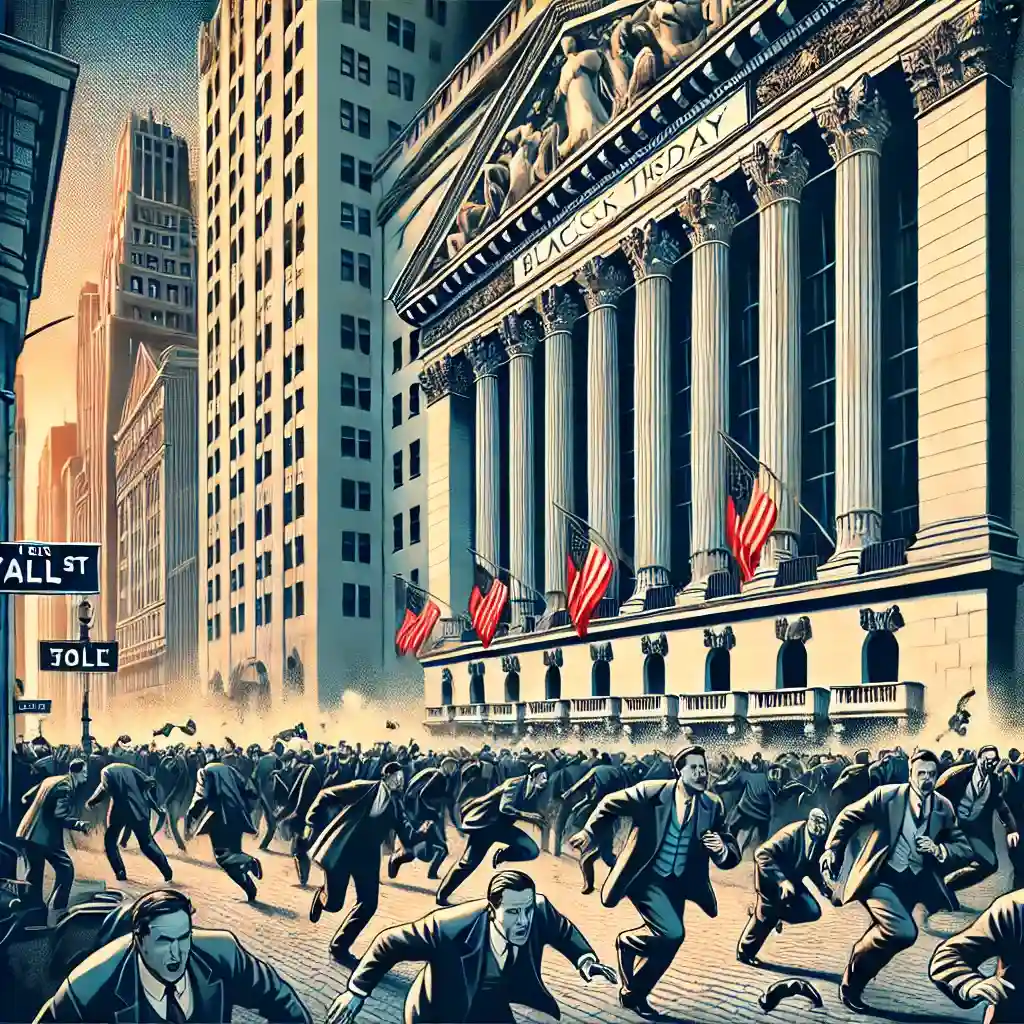Black Thursday - The Day the World Went Whoops
The theme of this English language resource is "learning casual English through real events."
The theme of this English resource is "Learn casual English through real events."
What Happened on Black Thursday?
Alright, folks, let's take a trip back Picture this: it's a regular Thursday in New York City, people are sipping coffee, chatting about their day, and then - BAM! The stock market decides to do a nosedive. It wasn't just any dip; it was more like a full-on cannonball into the deep end of a very empty pool. Stocks crashed, investors panicked, and chaos ruled the day. kicked off What we now call the Great Depression. oh, and by the way, because it happened on a Thursday, they fittingly named it "Black Thursday ." Kinda makes you think twice about getting too excited for the weekend, huh?
Q1: What are your thoughts on this part of the article?
- Sample AnswerI think it's interesting how such a normal day turned into something so chaotic. The way the writer described it made it easy to imagine the sudden panic. The way the writer described it made it easy.
Q2: Please summarize this article.
- Sample Answer: "This part of the article explains how the stock market crashed on Black Thursday in 1929, causing widespread chaos and marking the start of the the Great Depression."
Q3.Let me know if you have any questions.
1. what happened on dark Thursday?
Okay folks, let's go back in time to 1929. Imagine: a normal Thursday in New York City, people were having coffee and talking about their day, and then - bang! the stock market decides to take a dive. It wasn't just a drop; it was a huge plunge, like a cannonball into an empty swimming pool. Stock prices crashed, investors panicked, and chaos reigned that day. This event marked the beginning of the so-called "Great Depression. Incidentally, since it happened on a Thursday, it came to be known as "Dark Thursday. We can't look forward to the weekend too much, can we?
Now, let's talk using idioms.
Let the students choose one favorite idiom and make an example sentence.
1."Take a trip back" - This expression is a common idiom meaning to think back or reflect on past times or events.
- Example sentence: "Let's take a trip back to our high school days."
2."Do a nosedive". - An idiom meaning a sudden plunge, it is often used in the stock market or in situations where a sharp decline occurs.
- Example: "The company's profits did a nosedive after the scandal."
3."Kicked off". - It is an idiom meaning to start or initiate something. In this context, it refers to the beginning of the Great Depression.
- Example: "The event kicked off with an opening speech by the mayor.
How Did People React?

Imagine you're an investor back in 1929. You've got a fancy suit, maybe even a cool hat, and you're feeling on top of the world. Then, suddenly, your stocks start tanking. People were literally sprinting to Wall Street, yelling, and trying to sell everything they owned. Some investors thought they could solve things by Throwing even more money at the problemIn fact, the panic spread faster than a viral cat video today. The fear was real, and it was spreading like wildfire, leading to everyone thinking: "Is this the end of the world or what?
Q1: What are your thoughts on this part of the article?
- Sample Answer: "It was really chaotic, and I can imagine the panic everyone felt. the way people rushed to Wall Street must have been intense ."
Q2: Please summarize this article.
- Sample Answer: "People panicked and rushed to Wall Street, trying to sell their stocks. It was total chaos."
Q3.Let me know if you have any questions.
2. how did people react?
Imagine you're an investor in 1929. You're wearing a nice suit, maybe even a cool hat, and you feel like you've taken over the world. But all of a sudden, the stock market starts to crash. People literally rushed to Wall Street, yelling and screaming and trying to sell everything they had. Some investors even tried to solve the problem by throwing more money at it, but spoiler alert, that didn't work. In fact, the panic spread faster than today's viral cat videos. The fear was so real that it spread like wildfire and everyone thought, "Is this the end of the world?" I thought.
Now, let's talk using idioms.
Let the students choose one favorite idiom and make an example sentence.
1."Feeling on top of the world"This idiom means "very happy and confident." It describes a situation in which the investor felt successful.
- model sentence: "After getting that promotion, I was feeling on top of the world."
(I was very happy to receive that promotion.)
2."Stocks start tanking".Tanking" means "to fall sharply" or "to deteriorate," and is used especially to describe stock market conditions.
- model sentence: "The company's stock started tanking after the negative news."
(After that bad news, the company's stock price plummeted.)
3."Throwing even more money at the problem"This is an expression meaning "we pour money into a problem to solve it, but it doesn't always work.
- model sentence: "They tried to fix the project by throwing more money at it, but it didn't help."
(They poured more money into the project to resolve it, but to no avail.)
Why Should We Care Today?

You might be wondering, "Okay, but why does this even matter now?" Well, my friend, Black Thursday is like the ultimate It's the classic "Don't put all your eggs in one basket"Plus, it shaped a lot of the financial rules we have today. Back then, people learned the hard way That buying stocks without actually knowing what you're doing can lead to... well, disaster. So, the next time you 're thinking about Throwing all your cash into Some meme stock, just remember: Black Thursday was like the world's biggest "Oops, maybe that wasn't such a good idea" moment.
3. why should we still care?
'Okay, but what does this have to do with now?' You might be thinking. Well, my friends, Dark Thursday is like the ultimate reminder that you should be smart with your money. It's a classic "don't put all your eggs in one basket" situation. Besides, the events of that time shaped many of the financial rules we have today. Back then, people learned the hard way what happens when you act without really knowing what you are doing when you buy stocks. So the next time you decide to invest all your money in some meme stock, remember that Dark Thursday was the world's biggest "oops, maybe this wasn't such a good idea" moment.
Q1.What are your thoughts on this part of the article?
Sample Answer: "It's a good reminder about why we need to be careful with our money. the comparison to modern investing was relatable and made The comparison to modern investing was relatable and made the lesson clear."
Q2.Please summarize this article.
Sample Answer: "Black Thursday shows why we should be careful with money. it reminds us not to put all our eggs in one basket. learn from past mistakes. ."
Q3.Let me know if you have any questions.
Now, let's talk using idioms.
Let the students choose one favorite idiom and make an example sentence.
1."Don't put all your eggs in one basket"This idiom means "you should diversify your risk and not bet everything on one thing. It is often used as advice to reduce risk, especially in investments.
- model sentence: "When investing, it's better not to put all your eggs in one basket."
(When investing, it is better not to bet everything on one thing.)
2."Learned the hard way".This is an idiom meaning "learning through failure or pain." It refers to something learned the hard way through experience.
- model sentence: "He learned the hard way that you can't trust everyone."
(He learned the hard way not to trust everyone.)
3."Throwing all your cash into"This is an expression meaning "throw all your money into something," emphasizing risky behavior.
- model sentence: "She threw all her cash into that new business idea."
(She invested all her money in that new business idea.)
4."Oops, maybe that wasn't such a good idea."This phrase is used to express regret. It indicates mild regret for a past decision, as in, "Oops, maybe that wasn't such a good idea."
- model sentence: "After eating the entire cake, I thought, 'Oops, maybe that wasn't such a good idea.'"
(After eating all the cake, I thought, "Oops, maybe that wasn't such a good idea.")
Discussion Questions
If you have extra time, use this section.

- What would you do if you suddenly lost all your money in one day?
- Sample Answer: "Honestly, I'd probably freak out for a bit and then try to figure out how to get back on track. Maybe take a break and eat a lot of ice cream first."
- Why do you think people called it 'Black Thursday'?
- Sample Answer: "It's probably because it was such a dark day for investors. imagine waking up thinking it's just another Thursday and then, bam, you're broke.
- What lessons do you think people learned from Black Thursday?
- Sample Answer: "Don't panic-sell, and maybe don't put all your money in one thing. Also, having a backup plan sounds pretty smart!"
Question 1: What is the
What would you do if you suddenly lost all your money in one day?"
sample answer: "To be honest, I think they will panic a little first. Then they'll figure out how to get back on their feet. Maybe I'll take a break and eat a lot of ice cream first."
Question 2: What is the
Why do you think people called it 'Dark Thursday'?"
sample answer: "Probably because it was a very dark day for investors. You wake up thinking it's just another Thursday and all of a sudden you're broke. That's no fun at all."
Question 3: What is the
What lessons do you think we learned from Dark Thursday?"
sample answer: "Don't panic sell and don't throw all your money into one thing. Plus, it's wise to have a backup plan."






